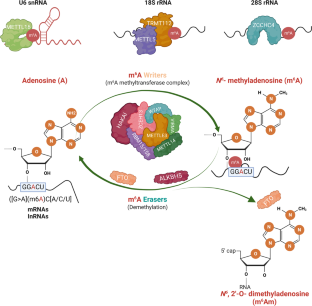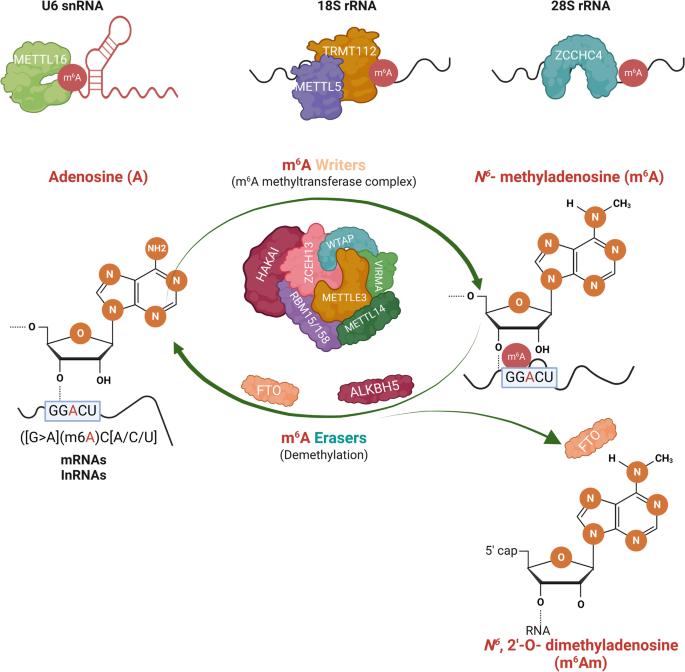Regulatory roles of N6-methyladenosine (m6A) methylation in RNA processing and non-communicable diseases
IF 4.8
3区 医学
Q1 BIOTECHNOLOGY & APPLIED MICROBIOLOGY
引用次数: 0
Abstract
Post-transcriptional RNA modification is an emerging epigenetic control mechanism in cells that is important in many different cellular and organismal processes. N6-methyladenosine (m6A) is one of the most prevalent, prolific, and ubiquitous internal transcriptional alterations in eukaryotic mRNAs, making it an important topic in the field of Epigenetics. m6A methylation acts as a dynamical regulatory process that regulates the activity of genes and participates in multiple physiological processes, by supporting multiple aspects of essential mRNA metabolic processes, including pre-mRNA splicing, nuclear export, translation, miRNA synthesis, and stability. Extensive research has linked aberrations in m6A modification and m6A-associated proteins to a wide range of human diseases. However, the impact of m6A on mRNA metabolism and its pathological connection between m6A and other non-communicable diseases, including cardiovascular disease, neurodegenerative disorders, liver diseases, and cancer remains in fragmentation. Here, we review the existing understanding of the overall role of mechanisms by which m6A exerts its activities and address new discoveries that highlight m6A’s diverse involvement in gene expression regulation. We discuss m6A deposition on mRNA and its consequences on degradation, translation, and transcription, as well as m6A methylation of non-coding chromosomal-associated RNA species. This study could give new information about the molecular process, early detection, tailored treatment, and predictive evaluation of human non-communicable diseases like cancer. We also explore more about new data that suggests targeting m6A regulators in diseases may have therapeutic advantages.


N6-甲基腺苷(m6A)甲基化在 RNA 处理和非传染性疾病中的调控作用
转录后 RNA 修饰是一种新兴的细胞表观遗传控制机制,在许多不同的细胞和生物体过程中都很重要。N6-甲基腺苷(m6A)是真核生物 mRNA 中最普遍、最多见和最普遍的内部转录改变之一,因此成为表观遗传学领域的一个重要课题。m6A 甲基化是一个动态调控过程,通过支持基本 mRNA 代谢过程的多个方面,包括前 mRNA 剪接、核输出、翻译、miRNA 合成和稳定性,调节基因的活性并参与多个生理过程。大量研究表明,m6A 修饰和 m6A 相关蛋白的异常与多种人类疾病有关。然而,m6A 对 mRNA 代谢的影响以及 m6A 与其他非传染性疾病(包括心血管疾病、神经退行性疾病、肝脏疾病和癌症)之间的病理联系仍然支离破碎。在此,我们回顾了对 m6A 发挥其活性的总体作用机制的现有认识,并讨论了强调 m6A 参与基因表达调控的多样性的新发现。我们讨论了 m6A 在 mRNA 上的沉积及其对降解、翻译和转录的影响,以及 m6A 对非编码染色体相关 RNA 物种的甲基化。这项研究可以为癌症等人类非传染性疾病的分子过程、早期检测、定制治疗和预测评估提供新的信息。我们还探讨了更多新数据,这些数据表明,针对疾病中的 m6A 调节因子可能具有治疗优势。
本文章由计算机程序翻译,如有差异,请以英文原文为准。
求助全文
约1分钟内获得全文
求助全文
来源期刊

Cancer gene therapy
医学-生物工程与应用微生物
CiteScore
10.20
自引率
0.00%
发文量
150
审稿时长
4-8 weeks
期刊介绍:
Cancer Gene Therapy is the essential gene and cellular therapy resource for cancer researchers and clinicians, keeping readers up to date with the latest developments in gene and cellular therapies for cancer. The journal publishes original laboratory and clinical research papers, case reports and review articles. Publication topics include RNAi approaches, drug resistance, hematopoietic progenitor cell gene transfer, cancer stem cells, cellular therapies, homologous recombination, ribozyme technology, antisense technology, tumor immunotherapy and tumor suppressors, translational research, cancer therapy, gene delivery systems (viral and non-viral), anti-gene therapy (antisense, siRNA & ribozymes), apoptosis; mechanisms and therapies, vaccine development, immunology and immunotherapy, DNA synthesis and repair.
Cancer Gene Therapy publishes the results of laboratory investigations, preclinical studies, and clinical trials in the field of gene transfer/gene therapy and cellular therapies as applied to cancer research. Types of articles published include original research articles; case reports; brief communications; review articles in the main fields of drug resistance/sensitivity, gene therapy, cellular therapy, tumor suppressor and anti-oncogene therapy, cytokine/tumor immunotherapy, etc.; industry perspectives; and letters to the editor.
 求助内容:
求助内容: 应助结果提醒方式:
应助结果提醒方式:


